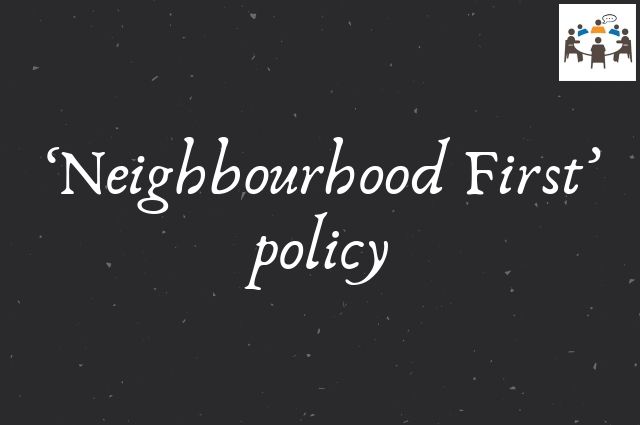Introduction:
“Neighbourhood First” is a foreign policy that India has been following ever since 2014. It means that the Indian government will focus more on its ties with its immediate neighbours as compared to its other strategic partners. Modi Government has time and again coined the phrase “Neighbourhood First” reiterating its stance on foreign policies. The first instance of “Neighbourhood First” policies could be seen when the SAARC nations were invited for the Primi Minister’s swearing-in ceremony. Now, after NDA’s re-election, BIMSTEC members had been invited to attend the swearing-in ceremony.
Significance:
The Modi government started out with creating cordial relations with all its neighbours including Pakistan and China. But, over the years, due to Pakistan abetted terrorism and separatism, the government has decided to turn a cold shoulder towards Pakistan. Also, any ties with China have lost their significance due to increasing support of China to Pakistan and CPEC invading POK.
On the other hand, India’s smaller neighbours are at a stage of growing developmental needs. At such a time, both India and its neighbours can benefit from this opportunity. India can invest in these countries, building stronger trade as well as political ties. But, China, another economic giant in the region has been running interference in India’s aspirations. Chinese projects have faster delivery schedules, easier implementation, and easier financing mechanisms. But, along with them come debt traps, which smaller countries are not able to figure out.
Relations with its neighbours:
India-Maldives: The relation has become less aggressive under the Modi government. During the emergency in the Maldives, India maintained a neutral stance. Despite a call for military intervention by India by some Maldivian commentators, India refrained from any interference. This showed a more passive stance than what India has usually followed. The former government in the Maldives signed a Free Trade Agreement with China, but the new government has expressed its disapproval for the FTA and proposed to withdraw it.
India-Srilanka: Despite the political tumult that had occurred in Srilanka, India decided to not put out any political statements. Srilanka has been seen to be more inclined to China in the recent past. The Hambantota port is practically owned by China. India, on the other hand, has been making efforts to restore the old friendship. It has taken the responsibility to operate the Hambantota airport, which is called the world’s emptiest airport.
India-Nepal: India’s relations with Nepal turned sour since 2015. The current government in Nepal led by Prime Minister K P Sharma Oli came to power in 2018 through its anti-India campaign. India has, since then, tried to mend relations. Nepal has also expressed its inclination towards China lately.
India-Bhutan & Bangladesh: These relations have improved with time. After Doklam, Bhutan reiterated its pro-India stance. And, under Sheikh Hasina, Bangladesh has built closer ties with India.
India-Myanmar: India is involved in several projects with Myanmar like the Kaladan project, Asian Trilateral Highway, etc. However, CMEC (Chine Myanmar Economic Corridor) is likely to be a matter of discontent between the two.
India-Afghanistan: India and Afghanistan have always been friendly nations. Several projects (dams, highways, etc.) have been undertaken by India in Afghanistan to help the landlocked country. India has also expressed its consent to having Taliban present in government negotiations. This is a new development in relations. Before this, India did not consent to it.
India-Pakistan: India’s relations with Pakistan have been tense in the past couple of years due to increased cross-border terrorism. After the Pulwama attack and Balakot Airstrikes, it further deteriorated.
India-China: Relations have turned somewhat cold after the Doklam stand-off. The Wuhan meeting last year attempted to revive the past relations but improvements are yet to be seen. China’s repeated support for Pakistan even at international forums has been a bone of contention since long.
Your Turn…
What is your take on this topic? Express your thoughts through the comment section below. And subscribe to our blog to read answers to trending GD topics.
Copyright @ Group Discussion Ideas.

